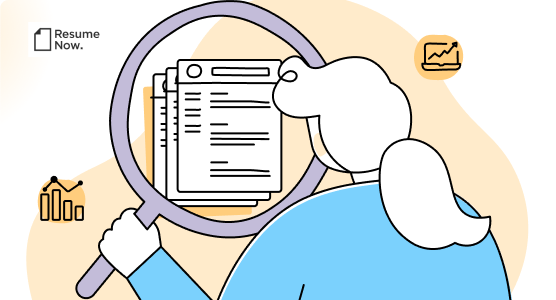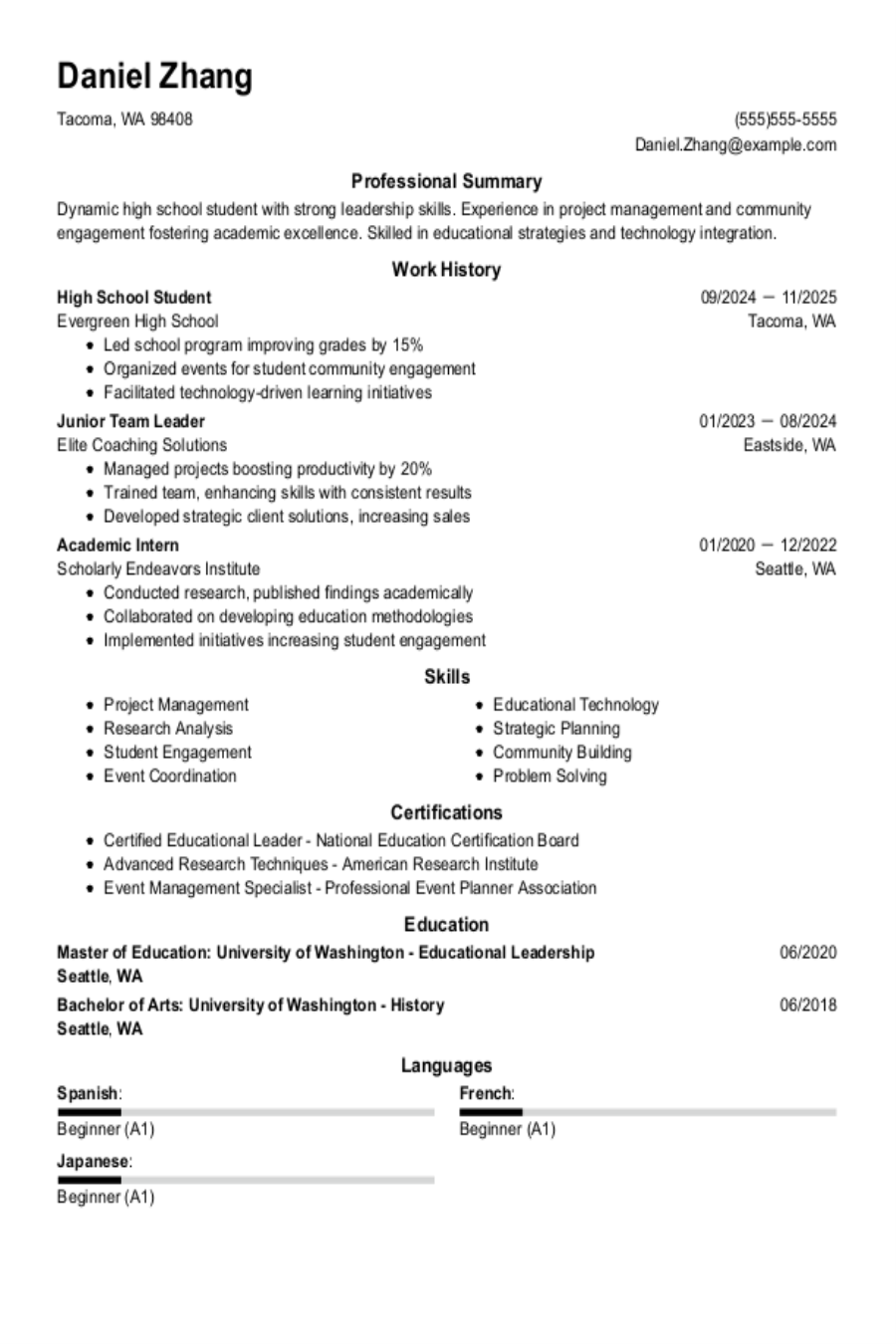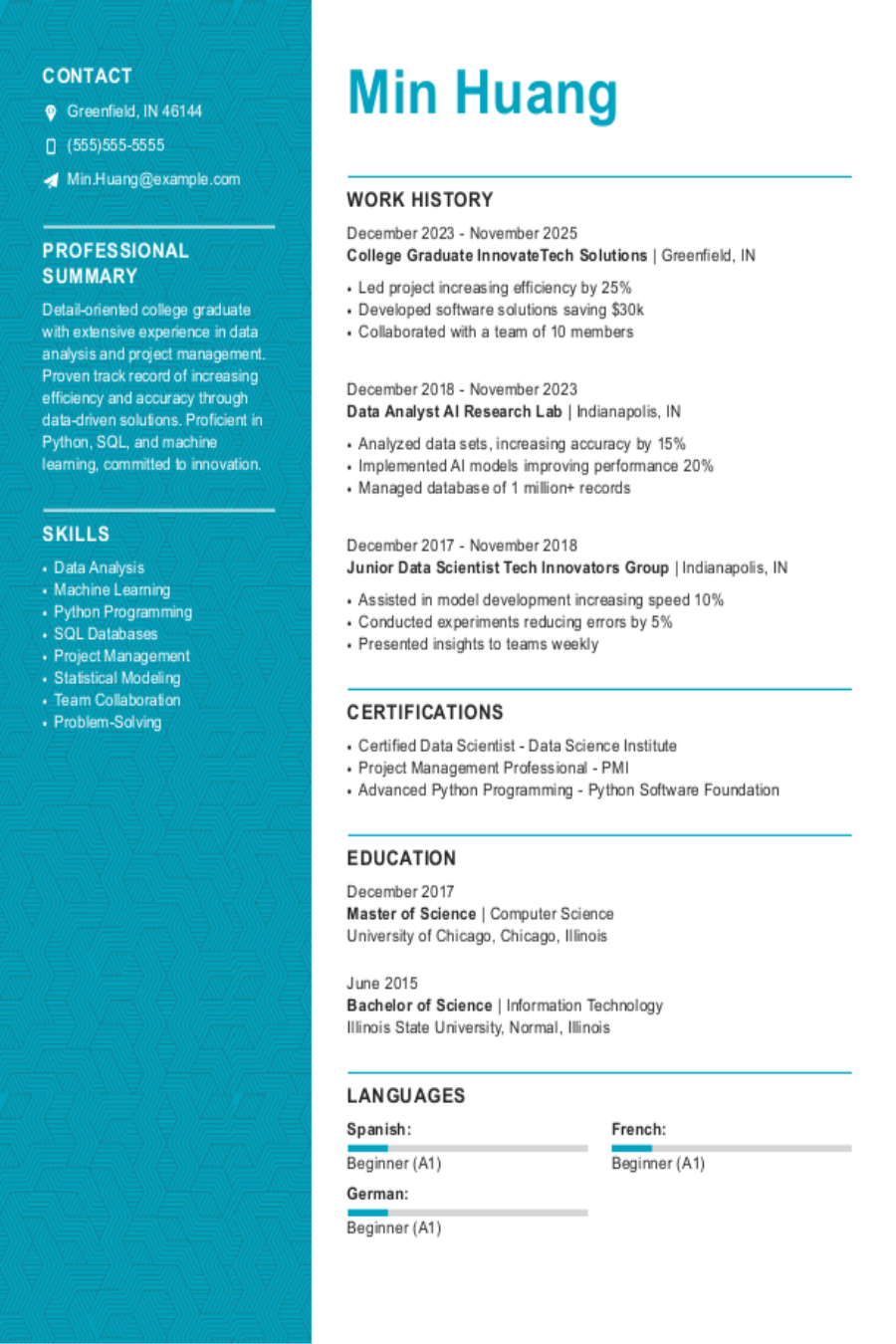Popular Teacher Resume Examples
Entry-level teacher resume
An entry-level resume for a teacher should focus on relevant coursework, student teaching experiences, certifications, and essential skills like communication, adaptability, and classroom management to demonstrate readiness for the role.
Showcases education: This resume opens with the education section, positioning the candidate’s academic achievements as a key strength.
Prioritizes readability: Opting for a clean and straightforward simple resume template allows teachers to present their qualifications clearly, making it easier for recruiters to quickly assess their experience and skills.
Mid-career teacher resume
A mid-career teacher's resume should emphasize a combination of effective teaching experiences, core instructional skills, and ongoing professional development to effectively demonstrate their growth in education.
Encourages quick scanning: A clean, well-structured format allows hiring managers to quickly assess qualifications. Clear sections and bullet points highlight achievements and skills, making the applicant's strengths stand out effortlessly.
Balances skills and experience: This applicant's resume effectively demonstrates a balance of advanced teaching skills and significant career progression, reflecting their commitment to educational excellence and innovative curriculum development over the years.
Experienced teacher resume
An experienced teacher's resume should highlight their educational achievements and teaching impact, clearly outlining their career growth and contributions to student success.
Quantifies achievements: Quantifiable achievements provide concrete evidence of this teacher's impact, making it easier for recruiters to see the value they bring. By showcasing specific metrics, such as improved test scores or increased student engagement, educators can effectively highlight their contributions to learning outcomes.
Optimized for ATS: This resume uses a well-structured template that merges a professional header with an ATS-friendly resume design, ensuring clarity for both human recruiters and automated systems during the screening process.
No experience teacher resume
A resume for an applicant with no experience should emphasize relevant skills, volunteer work, and educational achievements. This approach helps demonstrate their potential and commitment to the teaching profession.
Uses a simple style: The resume's straightforward design effectively highlights qualifications, emphasizing tutoring and mentoring experiences that demonstrate a commitment to student success.
Avoids jargon: Job seekers might feel pressured to embellish their resumes with complex terminology or exaggerate their responsibilities. However, this resume's straightforward and honest representation of their skills and experiences clearly illustrates their capabilities and dedication.
More resume examples
Additional Guides
Teacher Resume Template
Looking to create a standout application? Start with this teacher resume template, which you can easily modify to reflect your unique experience and qualifications.
Christina Richardson
Greenfield, IN 46143
(555)555-5555
Christina.Richardson@example.com
Professional Summary
Experienced education professional skilled in curriculum development and innovative teaching strategies. Proven success in boosting student performance and engagement by implementing advanced educational technologies and effective communication methods.
Work History
Teacher
Springfield Education Center - Greenfield, IN
January 2023 - October 2025
- Developed curriculum, boosting exam scores by 15%
- Led a team of 5 teachers in a school improvement project
- Implemented online tools, improving student engagement by 20%
Educational Facilitator
Green Valley Learning Academy - Indianapolis, IN
January 2021 - December 2022
- Coordinated workshops, increasing participation by 30%
- Developed new learning modules adopted school-wide
- Enhanced teaching methods, raising student grades by 10%
Instructional Assistant
Sunrise Public School - Indianapolis, IN
January 2019 - December 2020
- Assisted in classroom management for 25 students
- Supported special education program, improving outcomes
- Aided in curriculum design, boosted engagement by 25%
Skills
- Curriculum Development
- Classroom Management
- Student Engagement
- Educational Technology
- Lesson Planning
- Collaboration
- Public Speaking
- Mentoring
Education
Master of Education Curriculum and Instruction
University of Illinois Urbana-Champaign, Illinois
May 2019
Bachelor of Arts Education
University of Wisconsin Madison, Wisconsin
May 2017
Certifications
- Certified Educator Level 2 - National Education Association
- Teaching Excellence Certificate - American Teachers Association
Languages
- Spanish - Beginner (A1)
- French - Intermediate (B1)
- German - Beginner (A1)
Must-Have Skills on a Teacher Resume
A strong skills section is essential for making a standout resume that captures attention.
Education and training professionals play a vital role in fostering growth and development. The skills you highlight should reflect your ability to support learning and guide others toward success. Your resume is your opportunity to demonstrate how you contribute to progress and positive outcomes in learning environments.
The following data highlights the most relevant hard and soft skills for teaching positions, based on insights from Resume Now’s extensive resume database.
When you’re ready to improve your resume, don’t forget to try our AI Resume Skills Generator. It recommends both hard and soft skills tailored to your job title, allowing you to create a comprehensive and personalized skill set.
Writing Your Teacher Resume
Having explored these effective resume examples, you are now set to dive into the detailed process of how to write a resume. We will walk you through each section step by step, ensuring you create a compelling document that highlights your skills and experiences.
List your most relevant skills
A compelling skills section on your teacher resume should focus on including both hard skills, like lesson planning and classroom management, as well as soft skills such as empathy and communication.
To improve your chances of standing out, carefully analyze the job listing for keywords from the job listing related to teaching methodologies, educational technology, or student engagement. Incorporating these keywords not only resonates with human recruiters but also ensures that applicant tracking systems recognize you as a strong applicant who meets their criteria.
Example of skills on a teacher resume
- Dedicated to fostering a positive learning environment that encourages student engagement
- Proficient in developing customized lesson plans catering to diverse learning styles
- Strong communicator with the ability to build rapport with students and parents
- Committed to continuous professional development and educational best practices
A strong skills section should highlight both hard and soft skills to demonstrate a job seeker's comprehensive abilities. For instance, skill in lesson planning (hard skill) complements communication (soft skill), which is essential for effective teaching.
Highlight your work history
Your work experience section is your opportunity to show how you've positively impacted student learning and development, so include specific examples that showcase your teaching methods and successes.
When detailing each job entry, ensure you provide key information such as your job title, the school or institution where you worked, and the dates of employment. This helps potential employers quickly assess your experience level. Highlighting measurable outcomes—such as improved student performance or successful initiatives—can significantly improve your entries.
Example of a teacher work experience entry
- Teacher
Springfield High School - Springfield, IL
August 2018 - June 2023 - Develop and implement engaging lesson plans for diverse classrooms, improving student understanding and participation by 30%
- Foster a positive learning environment through effective classroom management techniques, resulting in a 20% decrease in behavioral issues
- Use data-driven assessments to identify individual student needs, tailoring instruction to improve overall class performance by 15%
- Collaborate with colleagues to design interdisciplinary projects that promote critical thinking and teamwork among students
- Mentor new teachers on curriculum development and classroom strategies, improving their effectiveness as educators within the first year
Highlighting outcomes and achievements in your experience section is essential for capturing employers' attention. By showcasing specific results, such as improved student performance or successful program implementations, you demonstrate your effectiveness as a teacher. This not only reflects your teaching capabilities but also provides concrete evidence of how you can contribute to a school's success.
Include your education
The education section of your teacher resume should display your academic qualifications in reverse-chronological order, starting with your most recent degree or certification. It is often unnecessary to include a high school diploma if you possess a bachelor's degree or higher. However, be sure to highlight any notable achievements such as honors or distinctions that are relevant to teaching.
When you are still pursuing a degree or have incomplete education, list the highest level completed and provide an anticipated graduation date. For ongoing studies, including bullet points that detail relevant coursework can be particularly helpful for new graduates.
Common certifications for a teacher resume
- National Board Certified Teacher (NBCT) – National Board for Professional Teaching Standards
- Certified Teacher Leader (CTL) – National Board for Professional Teaching Standards
- Teaching English as a Foreign Language (TEFL) – International TEFL Academy
- Special Education Certification – Council for Exceptional Children (CEC)
Showcase publications and research
As a teacher, adding a publications section on your resume can help demonstrate your expertise in education and your commitment to advancing knowledge in the field. When you include publications on your resume, you not only highlight your ability to contribute valuable insights but also reinforce your credibility as an educator who engages with current research and practices.
If you have several publications, it's beneficial to create a dedicated publications section on your resume. This allows potential employers to easily identify and assess your scholarly contributions. Conversely, if you have just one or two relevant works, consider integrating them into sections like education or professional experience, ensuring they are presented in a context that improves their significance.
Example of a publications section
- Smith, J., & Taylor, R. (2023). "Innovative Teaching Strategies in the Classroom". Journal of Educational Research, 45(2), 123-139.
- Jones, A. & Lee, T. (2024). "The Impact of Technology on Student Engagement". Educational Technology Review, 12(1), 67-82.
- Curriculum Team Leader, State Education Initiative (2022–2023). "Research Contribution: Curriculum Development for STEM Education". Led a team in creating integrated STEM curriculum for middle schools..
- Chen, H., Johnson, A., et al. (2022). "Collaboration in Education: Building Inclusive Classrooms". Inclusive Education Journal, 20(3), 95-110.
Sum up your resume with an introduction
Creating a compelling profile section on your resume is essential for capturing the attention of employers right from the start. It serves as your introduction and provides a snapshot of your qualifications, skills, and career goals.
For those with significant experience in education, using a professional summary format allows you to showcase your most notable achievements and relevant experiences upfront. If you're early in your career, consider adding a resume objective that showcases your drive for growth.
Professional summary example
Dedicated teacher with over 10 years of experience in diverse educational settings. Demonstrated ability to improve student engagement and academic performance through innovative lesson planning and personalized instruction. Proficient in classroom management, curriculum development, and fostering a positive learning environment that supports student growth.
Resume objective example
Enthusiastic teacher eager to use a passion for education and strong communication skills to foster a positive learning environment. Committed to applying creative lesson planning and effective classroom management techniques to improve student engagement and academic success.
As a teacher, your resume profile should be concise yet packed with essential information. Aim for no more than three sentences that highlight your most significant achievements and skills. Remember, you can elaborate on your experiences in your cover letter.
Add unique sections to set you apart
Incorporating optional resume sections can help you highlight your unique qualifications for teaching positions. These additional segments allow you to showcase what sets you apart in the education field.
These sections can illustrate different aspects of your professional journey, including relevant hobbies and volunteer experiences that align with your educational philosophy. By sharing your involvement in community service or interest in educational initiatives, you demonstrate not only your commitment to teaching but also the skills and values that improve your effectiveness as an educator.
Three sections perfect for a teacher resume
- Teaching philosophy: Your teaching philosophy outlines your approach to education and student engagement. Describe your beliefs about teaching and learning, including strategies you use to foster critical thinking and inclusivity in the classroom.
- Professional development: Engagement in professional development showcases your commitment to continuous improvement. List workshops, certifications, or courses you've completed that improve your teaching skills or subject matter expertise.
- Community involvement: Active involvement in community initiatives reflects your dedication beyond the classroom. Include volunteer activities or outreach programs you’ve participated in that contribute to educational advancement or support local needs.
5 Resume Formatting Tips
- Choose a format that matches your career stage.
Selecting the appropriate resume format is important based on your experience level. If you have extensive teaching experience, a chronological format highlights your career progression effectively. Conversely, if you're just starting out in education, consider a functional resume that emphasizes your skills and certifications instead of work history.
- Pick a smart resume template.
Using a professional resume template can greatly improve the readability of your application. A well-structured template allows your skills and experiences to shine through effortlessly. If you opt for a custom format, ensure it remains clear and uses fonts that are friendly for applicant tracking systems.
- Selecting an appropriate font.
When writing your resume, it's important to opt for a clean and professional font to improve clarity. Fonts like Helvetica, Garamond, or Verdana are excellent choices that ensure readability for both ATS systems and hiring managers.
- Use consistent formatting.
Ensure your resume is neatly aligned and maintains uniform margins. This creates a polished look that draws attention to your qualifications effectively.
- Keep your resume to one or two pages.
When outlining your resume, remember that resumes should be one page long for most job seekers. This helps you keep your content concise and highlights the key points of your experience effectively.
Tools for Your Job Search
Are you ready to advance your teaching career? Before you hit send on that application for your dream position, consider using our ATS Resume Checker. This invaluable tool provides insights into how your resume interacts with the automated systems many educational institutions employ during their initial applicant screenings.
If you're looking to elevate your resume even further, our AI Resume Builder is here to help. With tailored content recommendations specific to your teaching background and access to professional templates, it ensures that your skills and experiences stand out to hiring committees.
Frequently Asked Questions
Last Updated: November 13, 2025
Yes. A cover letter is important because it adds depth to your resume and allows you to communicate directly with potential employers. It’s your opportunity to express why the teaching role excites you and how your unique experiences make you an ideal applicant. Don’t overlook this chance—write a cover letter that improves your application.
For a quick and effective solution, consider using our AI Cover Letter Generator. It allows you to create tailored cover letters in just minutes, featuring various cover letter template options that match your resume perfectly. Streamline your job application process today!
A CV (curriculum vitae) is generally more extensive and detailed than a resume. While resumes typically range from one to two pages, CV templates allow you to create documents that span several pages, offering in-depth information about your academic achievements, research contributions, and professional experiences.
You’ll need a CV for roles in academia or specialized fields like law and medicine. If you think a CV is what you need for your next job application, our online CV Maker can assist you in crafting an impressive document swiftly. Choose from our variety of templates designed for different industries and career levels to get started on your tailored CV today.
To write a strong CV, start by organizing your document with clear headings like Education, Work Experience, Skills, and Certifications. Opt for a professional template that is easy to read and works well with applicant tracking systems. Tailor each application by using keywords from the job description to show your suitability for the role.
Also, examining CV examples created by industry professionals can offer valuable insights into effective presentation. Study how successful applicants emphasize their achievements and qualifications to help you create a compelling narrative that stands out in the competitive job market.
Many teachers begin their careers as classroom aides or substitute teachers. With further education, certifications, or advanced degrees, they can progress to lead teacher roles or administrative positions within educational institutions.
As a teacher, showcasing your dedication to ongoing growth is essential. You can do this by gaining relevant certifications and listing them prominently. Additionally, include any courses you’ve taken, seminars you've participated in, books that have influenced your practice, podcasts that inspire you, and memberships in professional organizations. These elements provide tangible evidence of your commitment to staying updated in the education field.
Was this information helpful? Let us know!
Hailey is a career advice writer dedicated to helping job seekers excel in their careers.
More resources

Only 1 in 10 Resumes Include Measurable Results, New Analysis of 18.4M U.S. Resumes Finds
Resume Now takes a closer look at measurable results on resume...

Top Entry‑Level Careers That Are Fast‑Growing, Higher‑Paying, and AI‑Resistant
Artificial intelligence is touching more parts of work every y...

What Does It Mean if an Interviewer Says "Good Luck" or "We'll Be In Touch"?
Read on to learn the meaning behind these standard post-interv...

Military Resume: Examples, Templates & Tips
As a military professional you need a resume that highlights ...

High School Student Resume: Examples, Templates & Tips for 2025
As a high school student your resume needs to highlight abili...

Graduate School Resume: Examples, Templates and Tips
As a college graduate crafting a resume that captures the att...

